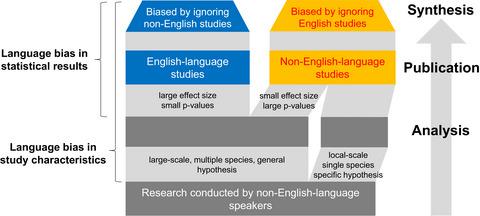当前位置:
X-MOL 学术
›
Ecol. Evol.
›
论文详情
Our official English website, www.x-mol.net, welcomes your
feedback! (Note: you will need to create a separate account there.)
Ignoring non-English-language studies may bias ecological meta-analyses.
Ecology and Evolution ( IF 2.3 ) Pub Date : 2020-05-29 , DOI: 10.1002/ece3.6368 Ko Konno 1 , Munemitsu Akasaka 2, 3 , Chieko Koshida 4 , Naoki Katayama 5 , Noriyuki Osada 6 , Rebecca Spake 7 , Tatsuya Amano 3, 8, 9
Ecology and Evolution ( IF 2.3 ) Pub Date : 2020-05-29 , DOI: 10.1002/ece3.6368 Ko Konno 1 , Munemitsu Akasaka 2, 3 , Chieko Koshida 4 , Naoki Katayama 5 , Noriyuki Osada 6 , Rebecca Spake 7 , Tatsuya Amano 3, 8, 9
Affiliation

|
Meta‐analysis plays a crucial role in syntheses of quantitative evidence in ecology and biodiversity conservation. The reliability of estimates in meta‐analyses strongly depends on unbiased sampling of primary studies. Although earlier studies have explored potential biases in ecological meta‐analyses, biases in reported statistical results and associated study characteristics published in different languages have never been tested in environmental sciences. We address this knowledge gap by systematically searching published meta‐analyses and comparing effect‐size estimates between English‐ and Japanese‐language studies included in existing meta‐analyses. Of the 40 published ecological meta‐analysis articles authored by those affiliated to Japanese institutions, we find that three meta‐analysis articles searched for studies in the two languages and involved sufficient numbers of English‐ and Japanese‐language studies, resulting in four eligible meta‐analyses (i.e., four meta‐analyses conducted in the three meta‐analysis articles). In two of the four, effect sizes differ significantly between the English‐ and Japanese‐language studies included in the meta‐analyses, causing considerable changes in overall mean effect sizes and even their direction when Japanese‐language studies are excluded. The observed differences in effect sizes are likely attributable to systematic differences in reported statistical results and associated study characteristics, particularly taxa and ecosystems, between English‐ and Japanese‐language studies. Despite being based on a small sample size, our findings suggest that ignoring non‐English‐language studies may bias outcomes of ecological meta‐analyses, due to systematic differences in study characteristics and effect‐size estimates between English‐ and non‐English languages. We provide a list of actions that meta‐analysts could take in the future to reduce the risk of language bias.
中文翻译:

忽视非英语研究可能会使生态荟萃分析产生偏差。
荟萃分析在生态学和生物多样性保护定量证据的综合中发挥着至关重要的作用。荟萃分析中估计值的可靠性在很大程度上取决于初级研究的无偏抽样。尽管早期的研究已经探讨了生态荟萃分析中的潜在偏差,但以不同语言发表的报告统计结果和相关研究特征的偏差从未在环境科学中得到测试。我们通过系统地搜索已发表的荟萃分析并比较现有荟萃分析中包含的英语和日语研究之间的效应大小估计来解决这一知识差距。在日本机构附属机构撰写的 40 篇已发表的生态荟萃分析文章中,我们发现 3 篇荟萃分析文章搜索了两种语言的研究,并涉及足够数量的英语和日语研究,从而产生了 4 篇合格的荟萃分析文章。 ‐分析(即在三篇荟萃分析文章中进行的四项荟萃分析)。在四项研究中,有两项荟萃分析中包含的英语和日语研究之间的效应大小存在显着差异,导致总体平均效应大小甚至在排除日语研究时的方向发生相当大的变化。观察到的效应大小差异可能归因于英语和日语研究之间报告的统计结果和相关研究特征(特别是类群和生态系统)的系统差异。 尽管样本量较小,但我们的研究结果表明,由于英语和非英语语言之间的研究特征和效应大小估计存在系统差异,忽略非英语语言研究可能会使生态荟萃分析的结果产生偏差。我们提供了元分析师未来可以采取的一系列行动,以减少语言偏见的风险。
更新日期:2020-07-25
中文翻译:

忽视非英语研究可能会使生态荟萃分析产生偏差。
荟萃分析在生态学和生物多样性保护定量证据的综合中发挥着至关重要的作用。荟萃分析中估计值的可靠性在很大程度上取决于初级研究的无偏抽样。尽管早期的研究已经探讨了生态荟萃分析中的潜在偏差,但以不同语言发表的报告统计结果和相关研究特征的偏差从未在环境科学中得到测试。我们通过系统地搜索已发表的荟萃分析并比较现有荟萃分析中包含的英语和日语研究之间的效应大小估计来解决这一知识差距。在日本机构附属机构撰写的 40 篇已发表的生态荟萃分析文章中,我们发现 3 篇荟萃分析文章搜索了两种语言的研究,并涉及足够数量的英语和日语研究,从而产生了 4 篇合格的荟萃分析文章。 ‐分析(即在三篇荟萃分析文章中进行的四项荟萃分析)。在四项研究中,有两项荟萃分析中包含的英语和日语研究之间的效应大小存在显着差异,导致总体平均效应大小甚至在排除日语研究时的方向发生相当大的变化。观察到的效应大小差异可能归因于英语和日语研究之间报告的统计结果和相关研究特征(特别是类群和生态系统)的系统差异。 尽管样本量较小,但我们的研究结果表明,由于英语和非英语语言之间的研究特征和效应大小估计存在系统差异,忽略非英语语言研究可能会使生态荟萃分析的结果产生偏差。我们提供了元分析师未来可以采取的一系列行动,以减少语言偏见的风险。











































 京公网安备 11010802027423号
京公网安备 11010802027423号